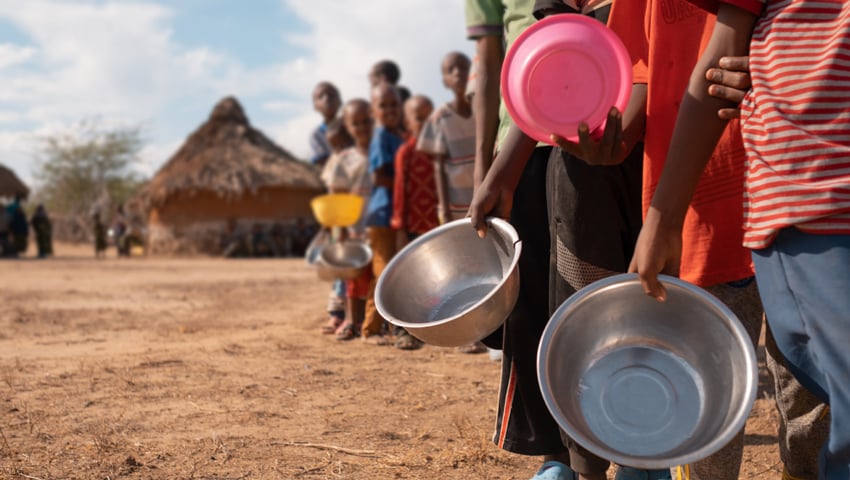NEW authoritative data from the UN’s State of Food Security and Nutrition in the World (SOFI) report, published on 12th July, reveals that global hunger was at catastrophic levels in 2022 – a year ravaged by food price crisis, conflict, and economic and climate shocks.
Over 122 million more people are facing hunger in the world since 2019 due to the pandemic and repeated weather shocks and conflicts, including the war in Ukraine.
If trends remain as they are, the Sustainable Development Goal of ending hunger by 2030 will not be reached, the Food and Agriculture Organization of the United Nations (FAO), the International Fund for Agricultural Development (IFAD), the United Nations Children’s Fund (UNICEF), the World Health Organization (WHO) and the World Food Programme (WFP) warn.
The International Panel of Experts on Sustainable Food Systems (IPES-Food) have said that this sobering wakeup call paints a worrying picture.
Jennifer Clapp, food security expert with IPES-Food and professor at the University of Waterloo, Canada, said “The world is facing disturbingly high levels of hunger right now. Years of progress on improving food security and nutrition have been erased. Governments have failed to make food systems shock-resistant, to shield people from food price inflation, or to address the ticking time bomb of debt.
“We desperately need a new recipe for addressing hunger – based on the right to food, less reliance on volatile global markets, and on countries producing more food for their own people.”
The SOFI data shows that food insecurity has taken hold at catastrophically high levels with no progress in sight. 735 million people (9.2 percent of the world population) faced chronic undernourishment in 2022, and nearly 30% of the world’s population experienced moderate or severe food insecurity.
Buffeted by covid, conflict and climate change, food systems have proven to be highly vulnerable to shocks and highly inequitable.
IPES Food said “Thanks to years of stagnation and deterioration, we are on course for 600 million people to remain chronically undernourished by 2030, leaving the Sustainable Development Goals in tatters, unless major changes are enacted.”
Hunger continued to rise in Africa, hitting one in five of the continent’s population. Although there was some limited progress in Asia and Latin America.
Million Belay, IPES-Food expert and coordinator of the Alliance for Food Sovereignty in Africa (AFSA), said “It’s shocking that hunger has risen in Africa for ten years in a row. But our exploitative global economic system has prioritised servicing debt over feeding people, exporting cash crops over growing nutritious food for Africans, and burning fossil fuels over adapting to climate change.
“African countries have been left critically vulnerable to the blows of the pandemic, the war in Ukraine, and climate change. Our governments are starved of cash to build the sustainable food systems we need to feed ourselves. The dominant food system is reducing people’s resilience to shocks and leading to perpetual debt and food dumping – this must change.”
The cost of living crisis is also taking a heavy toll, with the cost of a healthy diet now nearly 7% higher than in 2019, and out of reach for nearly half the world population – showing governments and the food industry are failing to get decent, healthy food to where it is needed.
New data from 11 African countries shows that farmers and rural populations are more exposed to food price volatility and hunger than previously thought. 33% of people in rural areas face moderate or severe food security, higher than in urban areas.
Olivier De Schutter, co-chair of the International Panel of Experts on Sustainable Food Systems (IPES-Food), and UN special rapporteur on extreme poverty and human rights, said “Once again the world is plagued by hunger. A healthy diet is unattainable for nearly half of the world’s population – even while food manufacturers and giant agriculture corporations enjoy bonanza profits.
“Low income countries are trapped in debt, unable to invest in combating hunger, and condemned to export cash crops rather than feed their own people. To have any hope of reaching the Sustainable Development Goals a transformation is needed – with social protection schemes that guarantee the right to food for the world’s poorest, debt cancellation, and investment in diverse, resilient agroecological food production.”
IPES-Food is calling for more diverse and resilient food systems to better withstand shocks, reduce import dependencies, and enable communities to feed themselves in the face of climate change; as well as urgent debt relief for heavily indebted low-income countries.
